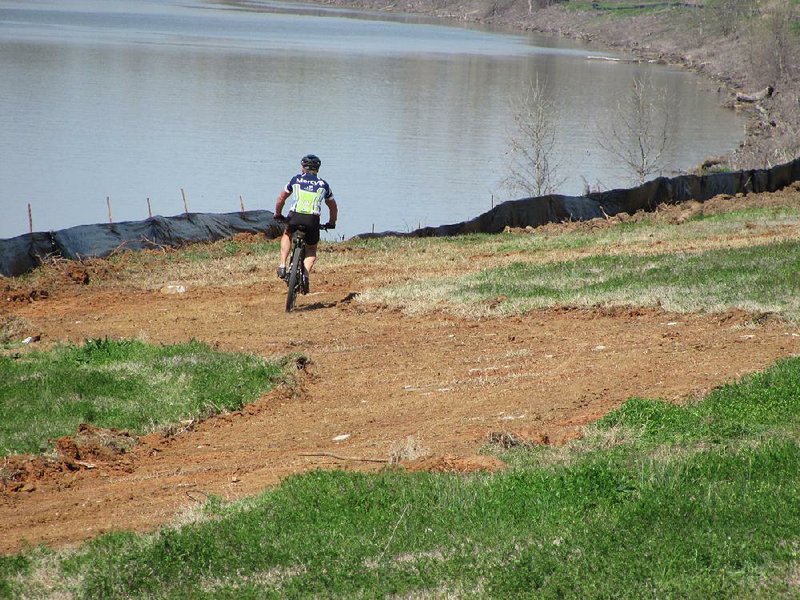FORT SMITH -- Construction will begin soon on a new trail at Chaffee Crossing that will add another link in the city's growing trail system.
City directors on Tuesday awarded a $1.35 million contract to Steve Beam Construction of Fort Smith to build 1.7 miles of paved trail in an initial segment.
The segment will run from Chad Colley Boulevard northwest along Roberts Boulevard, then continue northwest where Roberts ends onto the Magellan Pipeline pathway and connect to an existing trail near Massard Road.
Another leg of the segment, according to project engineer Mickle Wagner Coleman, will take off at a 90-degree angle southwest paralleling Wells Lake Road and end at McClure Drive.
Money for the trail will come from a city one-eighth percent sales tax for parks, which the city Finance Department estimates generates more than $2.6 million a year. The Fort Chaffee Redevelopment Authority also has pledged to contribute $500,000 toward development of each of the three segments of the project.
Helping to pay for the first segment will be a $500,000 Transportation Alternatives Program grant from the Arkansas Department of Transportation.
The second segment of the project, which the Fort Smith Parks and Recreation Department estimates will cost $750,000, consists of extending the first segment from McClure Drive southwest about a mile to Massard Road near the Wells Lake Road intersection. Work on the second segment is expected to begin in 2020.
A third segment, work on which could begin in 2021, is estimated to run about 4 miles but the route has yet to be determined. A parks department capital improvement plan puts the cost of the segment at $2.1 million.
"This is a long-term plan that is coming to fruition," said Lorie Robertson, redevelopment authority director of marketing.
With many of the 2,900 homes anticipated for Chaffee Crossing already built, she said, the trails will provide the families living in and moving to the area with one more amenity to the many outdoor activities already available.
"The addition of the new trail section will complement the economic growth and the active lifestyle environment in that area," said Casey Millspaugh, chairman of the Fort Smith Parks and Recreation Commission.
Drew Linder, one of the founders of Friends of Recreational Trails, said the Chaffee Crossing trails will be a significant addition because of the amount of development that has occurred there.
The Arkansas Colleges of Health Sciences is open and building its second medical college on the campus. ArcBest Corp. has moved into its new headquarters at Chaffee Crossing. Brownwood Life Care Center has opened its facility just east of ArcBest, and huge swaths of woods of the former Army base land are being cleared monthly for new residential subdivisions.
The Chaffee Crossing trail contract is the latest in an ongoing effort to riddle Fort Smith with trails. Millspaugh said other areas of the Arkansas River Valley, such as Van Buren, Alma and Greenwood, also are developing trail plans.
"The vision behind the trails plan is to create a continuous, connected trail system throughout the city that will connect people to different areas of town," Millspaugh said.
The plan calls for circling the city with routes to parks and recreational activities for growing numbers of bike riders, runners and walkers.
In October, the city made the final payment and accepted completion of the 6.3-mile Greg Smith River Trail. It consists of a 1.6-mile concrete trail that runs along the Arkansas River north from Harry E. Kelley Park past the new skate/bike park and the U.S. Marshals Museum under construction, and connects with a paved 3.1-mile trail atop the Rice-Carden levee and a 1.3-mile concrete trail along Riverfront Drive to Fort Smith Park.
The Rice-Carden portion of the trail cost $1.76 million, with Friends of Recreational Trails contributing $550,000. Linder said the money from the group was raised from grants, corporate donations, individuals and events such as the Fort Smith Marathon and Ales for Trails.
The city parks department plans to provide more than $2.5 million in funding from the eighth-percent sales tax to develop what is being called the Maybranch Trail. It will begin at the Greg Smith Trail and go east on North P Street, following the path of new sewer lines being laid as part of work required by the city's sewer improvement consent decree with the federal government and state of Arkansas.
The trail will follow the pipeline path because the city will have already acquired the right-of-way, which will save money for the parks department, Deputy Director Sara Deuster said.
She said the trail will follow the sewer line path to Martin Luther King Jr. Park at Greenwood Avenue and North O Street. Future phases over five years will eventually take the trail to the Church League ball fields just south of Creekmore Park on Old Greenwood Road. Part of the trail will consist of converting an old railroad track bed into part of the trail.
"The Maybranch Railroad Trail will also be a great addition," Linder said, "as it will be very accessible since it runs through the center of the north side of the city."
Another future trail will be soft trails on more than 300 acres city directors purchased in November from Kansas City Southern Railroad. It is located on the river side of the Rice-Carden levee next to the Greg Smith trail.
According to a Fort Smith memo from Parks Director Doug Reinert, the Friends of Recreational Trails and the Frontier Ozark Off-Road Cyclists have committed to developing the trail and the city will bear none of the cost other than the $103,914 the directors voted to pay for the land.
The trail would be open to runners, mountain bikers, walkers and possibly horseback riders, the memo said.
State Desk on 01/14/2019
